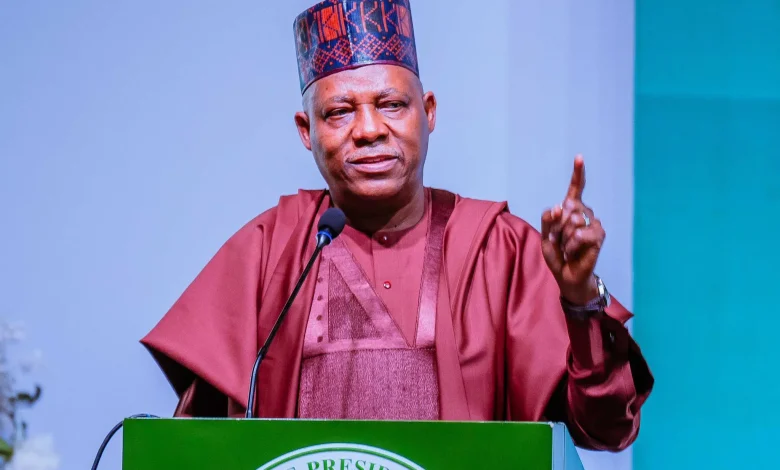The capital market is a vital tool for diversifying the country’s economy away from an excessive dependence on a single product, according to Vice President Senator Kashim Shettima. This is done in order to promote domestic industrialization and draw in both foreign direct investments and domestic capital.
He maintained that a healthy capital market has the power to increase financial inclusion, release latent wealth, and raise citizens’ standards of life throughout the process.
Presented by the Securities and Exchange Commission (SEC) and the National Judicial Institute (NJI), the Vice President gave a speech in Abuja on Monday to kick off a two-day Capacity Building Interactive Workshop on Capital Market Law, Ethics, and Judicial Interpretations for Judges of Superior Courts.
Judges, lawmakers, regulators, and legal and capital market specialists take part in the workshop to discuss how to modernize dispute resolution in Nigeria’s capital market and make sure the system keeps up with the rapidly changing financial practices of the world.
Tope Fasua, Special Adviser to the President on Economic Matters, represented the vice president. He explained that the capital market is the engine that propels progress and prosperity by channeling national savings into profitable endeavors.
He believes that the workshop’s theme, “Repositioning the Nigerian Capital Market for National Economic Transformation through Effective Dispute Resolution,” was more than just a discussion point; rather, it was “a clarion call, a strategic imperative that resonates deeply with the economic agenda of this administration.”
The fact that a strong, effective, and reliable capital market is the cornerstone upon which a sustained national economic change can be erected was emphasized by Shettima as evidence of this.
The vice president noted that the capital market is the heartbeat of contemporary economies, a complex ecosystem that mobilizes long-term capital for profitable investments, and it is much more than just a venue for buying and selling securities.
By bringing together savers and investors, it gives companies the cash they need to grow, innovate, and add jobs. It is where money for infrastructure projects is obtained, where SMEs can grow, and where entrepreneurs’ aspirations can come true. The capital market is even more important in Nigeria, a country with a young, vibrant population and a wealth of possibilities. It is a vital instrument for pushing our economy away from an excessive dependence on a single commodity, encouraging homegrown manufacturing, and drawing in both foreign direct investment and domestic capital.
In the end, a healthy capital market may raise our residents’ standard of living by enhancing financial inclusion and releasing latent wealth. “It is the mechanism that directs national savings into profitable endeavors, propelling the wheels of development and prosperity,” he said.
He argued that given the scope of the country’s goals—which include a revitalized agricultural sector, a diversified industrial base, a thriving digital economy, and massive infrastructure development—none of them can be realized without significant, long-term capital, which can only be found in the capital market.
While the banking industry is important and mostly gives short-term financing, he clarified that the capital market, with its ability to offer stock and long-term debt instruments, is what provides the patient capital needed for the transformative operations.
He emphasised that it is the framework for public-private partnerships, future income securitisation, and enabling regular Nigerians to share in our country’s success.
He added that trust is a fundamental and non-negotiable element that is necessary for any capital market to be effective. Investors, whether local or foreign, institutional or retail, will only commit their hard-earned capital in situations where they are certain that their investments are safe, that transactions are transparent, and that their rights are upheld.
This confidence, he said, is based on robust regulatory frameworks, competent market operations, and—above all—a fair and efficient dispute resolution process.
The potential of our capital market has occasionally been impeded by certain obstacles, which we admit. These include matters concerning investor education, market liquidity, and, in fact, the perception of the effectiveness and equity of our dispute resolution procedures.
Capital moves about a lot in today’s globalized financial market, looking for situations that provide not only rewards but also legal predictability and assurance. According to him, any apparent flaw in our dispute resolution process could put off prospective investors and cause them to move their money to more alluring jurisdictions.
Judge Kudirat Kekere-Ekun, the Chief Justice of Nigeria (CJN), who was represented by Justice Stephen Jonah Adah of the Supreme Court, said in her keynote speech that the capital market is now a vital tool for economic empowerment and participation rather than a remote concept reserved for institutional or high finance investors.
From pension fund contributors and fintech entrepreneurs to diaspora bond subscribers and small investors, the CJN noted that the capital market impacts opportunities, livelihoods, and national competitiveness.
So, she said, it was a democratic weapon for wealth creation and national stability, not just an economic process.
Read Also: God Cannot Be Mocked, You’ll Face Consequences Soon — Atiku Tells Wike
But it’s vulnerable, just like all other critical systems. In addition to being a storehouse of trust, the capital market can also be a source of distortion. Although it is an innovative platform, fraud and regulatory arbitrage are also possible. The judiciary has a significant role in this. They are active stewards of business fairness and economic integrity, not passive arbiters.
The rise of new financial frontiers, such as digital assets, cryptocurrency transactions, green finance tools, and transnational securities, must be recognized. These advancements frequently surpass those of conventional judging tools. We must not fall for the fallacy that originality eliminates precedent, nor is it adequate to apply established concepts without modification. We must instead address these concerns in a way that maintains legal coherence while being adaptable to changing business circumstances. An encouraging step is the recent passage of the Investments and Securities Act, 2025. Its clauses provide improved investor protection and regulatory clarity. But in the absence of a purposeful and knowledgeable interpretation, even the most advanced laws are useless. Accordingly, it is our responsibility to give these statutory instruments vitality and significance that is consistent with the intentions of the legislature, business sense, and ethical awareness.
There is more to this workshop than just training. It provides a forum for introspection and rejuvenation; it serves as a testing ground for the demands that contemporary financial adjudication places on the Bench. “Our rulings in capital market disputes have an impact outside of the courtroom; they affect investor behavior, public confidence, and the stability of financial institutions,” Kekere-Ekun stated.
“When justice is swift, sound, and credible, capital is attracted, innovation flourishes, and prosperity becomes inclusive,” he added, urging the judges to remember the potent messages their rulings provide.
In contrast, she stated that “confidence is undermined and economic activity is suppressed when decisions are unclear, uninformed, or delayed.”
For this reason, she emphasized, the judiciary must regard itself as a co-architect of the national economic system as well as an interpreter of the law. The workshop, she noted, was held during a period of significant national importance, marked by rapid changes in regulatory architecture as well as economic complexity.
“Our jurisprudence must respond with both integrity and intelligence,” she said, adding that the judiciary cannot remain passive in such a context.
Not only is this forum relevant, it is essential. “It is a reaffirmation of our collective resolve to enhance our interpretive lens and strengthen judicial competence within the ever-expanding domain of capital markets and economic justice,” she said.
In his opening remarks, SEC Director General Dr. Emomotimi Agama praised President Bola Tinubu and the National Assembly for the Investments and Securities Act (ISA), 2025’s successful passage and enactment. He added that the historic law represented a major turning point in Nigeria’s financial and economic sector, bolstering investor confidence, fortifying regulatory frameworks, and improving the country’s standing in international markets.
Agama said that the workshop was a part of SEC’s strong commitment to a deeper engagement with all stakeholders, making sure that the provisions of ISA 2025 are widely discussed, understood, and disseminated in order to achieve the goals of restoring investor confidence, providing timely assistance to investors who have been wronged, and encouraging widespread Nigerian participation in wealth creation.
The Economic and Financial Crimes Commission (EFCC) Chairman, Mr. Ola Olukoyede, recalled in his speech the continuing investment and commercial crime cases that the anti-graft agency is handling with Binance and CBEX, among other companies.
The need to comprehend the complexities of some of these new issues pertaining to virtual assets has become imperative. Two months ago, a report was published by an international development agency that the World Trade Organization (WTO) had hired to conduct a survey on virtual assets and investment. The agency’s findings indicated that, in 2023 alone, virtual assets and investment funds accounted for approximately 9.8% of global GDP.
“The report for 2024 has not yet been produced. He stated that it is anticipated to increase to 14.5% by 2025 and 2026.
“It’s important to understand that by the time some of these emerging issues start coming before you; of course, we have started filing processes,” he reminded the judges, “you will start hearing some funny terminologies your Lordships have not heard before.”
He used a number of terms, including distributed ledger, mining, digital wallet, stable currency, blockchain, decentralized finance (DeFi), bitcoin, and more.
According to him, when the judges hear the word mining, they don’t think of gold or uranium, but rather money service.
He pointed out that these were problems that would arise when cryptocurrencies or virtual assets gained popularity and were made legal by the passage of ISA 2025.
Since the EFCC had reason to publish the identities of roughly 58 unlicensed companies operating pyramid schemes in Nigeria a few months prior, he said, it was critical that Nigeria rise to the occasion.
As the SEC proved they lacked a license, he added, the Central Bank of Nigeria (CBN) denied their legal existence.
The 58 of them have already been charged by the EFCC, Olukoyede continued, emphasizing that 12 of them have already been found guilty while the other cases are still pending.
It is a significant task for us. We wish to enlist the judiciary’s assistance in order to guarantee that this threat is addressed,” he begged.
Earlier in his remarks, Senate Committee on Capital Markets Chairman Osita Izunaso revealed that he is already sponsoring a measure to change the Investments and Securities Tribunal (IST) from a tribunal to a regular court.
When the law is enacted, the IST will no longer operate as a tribunal and will instead take on the typical functions of regular courts, including the appointment of judges and session scheduling.
He encouraged the SEC to launch a nationwide, aggressive campaign to raise awareness of the IST Act 2025.



